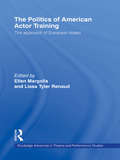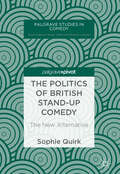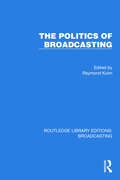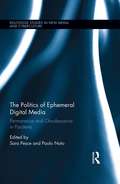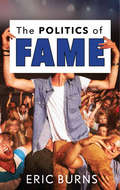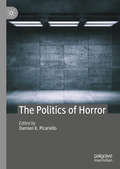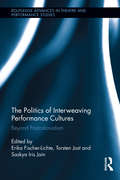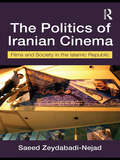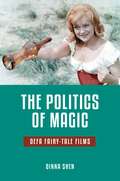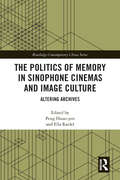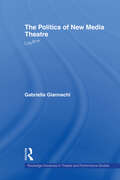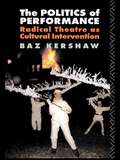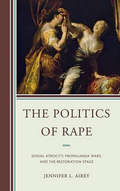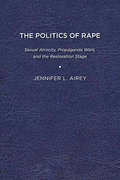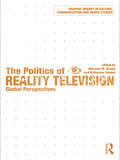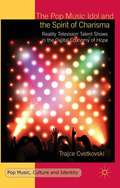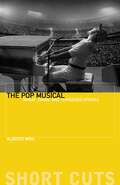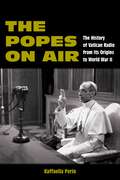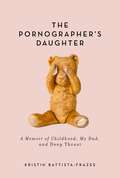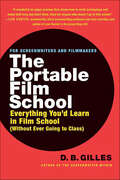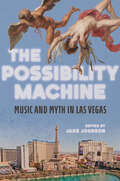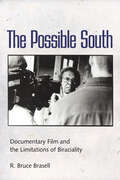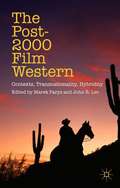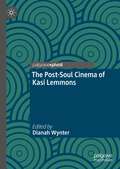- Table View
- List View
The Politics of American Actor Training (Routledge Advances in Theatre & Performance Studies)
by Ellen Margolis Lissa Tyler RenaudThis book addresses the historical, social, colonial, and administrative contexts that determine today's U.S. actor training, as well as matters of identity politics, access, and marginalization as they emerge in classrooms and rehearsal halls. It considers persistent, questioning voices about our nation’s acting training as it stands, thereby contributing to the national dialogue the diverse perspectives and proposals needed to keep American actor training dynamic and germane, both within the U.S. and abroad. Prominent academics and artists view actor training through a political, cultural or ethical lens, tackling fraught topics about power as it plays out in acting curricula and classrooms. The essays in this volume offer a survey of trends in thinking on actor training and investigate the way American theatre expresses our national identity through the globalization of arts education policy and in the politics of our curriculum decisions.
The Politics of British Stand-up Comedy: The New Alternative (Palgrave Studies in Comedy)
by Sophie QuirkThis Palgrave Pivot questions how a new generation of alternative stand-up comedians and the political world continue to shape and influence each other. The Alternative Comedy Movement of the late 1970s and 1980s can be described as a time of unruly experimentation and left-wing radicalism. This book examines how alternative comedians continue to celebrate these characteristics in the twenty-first century, while also moving into a distinct phase of artistic development as the political context of the 1970s and 1980s loses its immediacy. Sophie Quirk draws on original interviews with comedians including Tom Allen, Josie Long, John-Luke Roberts and Tony Law to chart how alternative comedians are shaped by, and in turn respond to, contemporary political challenges from neoliberalism to Brexit, class controversy to commercialism. She argues that many of our assumptions about comedy’s politics must be challenged and updated. This book is essential reading for anyone who wants to understand the working methods and values of today’s alternative comedians.
The Politics of Broadcasting (Routledge Library Editions: Broadcasting #28)
by Raymond KuhnThe Politics of Broadcasting (1985) examines the state of broadcasting in a variety of Western democracies from a political viewpoint, written at a time when new telecommunications and information technology revolutionised television and radio. The book describes and analyses the problems faced by politicians and broadcasters in responding to these changing technological and political environments.
The Politics of Ephemeral Digital Media: Permanence and Obsolescence in Paratexts (Routledge Studies in New Media and Cyberculture)
by Paolo Noto Sara PesceIn the age of "complex Tv", of social networking and massive consumption of transmedia narratives, a myriad short-lived phenomena surround films and TV programs raising questions about the endurance of a fictional world and other mediatized discourse over a long arc of time. The life of media products can change direction depending on the variability of paratextual materials and activities such as online commentaries and forums, promos and trailers, disposable merchandise and gadgets, grassroots video production, archives, and gaming. This book examines the tension between permanence and obsolescence in the production and experience of media byproducts analysing the affections and meanings they convey and uncovering the machineries of their persistence or disposal. Paratexts, which have long been considered only ancillary to a central text, interfere instead with textual politics by influencing the viewers’ fidelity (or infidelity) to a product and affecting a fictional world’s "life expectancy". Scholars in the fields of film studies, media studies, memory and cultural studies are here called to observe these byproducts' temporalities (their short form and/or long temporal extention, their nostalgic politics or future projections) and assess their increasing influence on our use of the past and present, on our temporal experience, and, consequently, on our social and political self-positioning through the media.
The Politics of Fame
by Eric BurnsCelebrities can come from many different realms: film, music, politics, sports. But what do all these major celebrities have in common? What elevates them to the status of household names while their equally talented peers remain in relative obscurity? Is it just a question of charisma, or does fame depend more on the collective fantasies of fans than the actual accomplishments of celebrities? In search of answers, cultural historian Eric Burns delves deep into the biographies of some of the most famous figures in American history, from Benjamin Franklin to Fanny Kemble, Elvis Presley to Gene Tierney, and Michael Jordan to Oprah Winfrey. Through these case studies, he considers the evolution of celebrity throughout the ages. More controversially, he questions the very status of fame in the twenty-first century, an era in which thousands of minor celebrities have seen their fifteen minutes in the spotlight. The Politics of Fame is a provocative and entertaining look at the lives and afterlives of America’s most beloved celebrities as well as the mad devotion they inspired. It raises important questions about what celebrity worship reveals about the worshippers—and about the state of the nation itself
The Politics of Horror
by Damien K. PicarielloThe Politics of Horror features contributions from scholars in a variety of fields—political science, English, communication studies, and others—that explore the connections between horror and politics. How might resources drawn from the study of politics inform our readings of, and conversations about, horror? In what ways might horror provide a useful lens through which to consider enduring questions in politics and political thought? And what insights might be drawn from horror as we consider contemporary political issues? In turning to horror, the contributors to this volume offer fresh provocations to inform a broad range of discussions of politics.
The Politics of Interweaving Performance Cultures: Beyond Postcolonialism (Routledge Advances in Theatre & Performance Studies #33)
by Erika Fischer-Lichte Torsten Jost Saskya Iris JainThis book provides a timely intervention in the fields of performance studies and theatre history, and to larger issues of global cultural exchange. The authors offer a provocative argument for rethinking the scholarly assessment of how diverse performative cultures interact, how they are interwoven, and how they are dependent upon each other. While the term ‘intercultural theatre’ as a concept points back to postcolonialism and its contradictions, The Politics of Interweaving Performance Cultures explores global developments in the performing arts that cannot adequately be explained and understood using postcolonial theory. The authors challenge the dichotomy ‘the West and the rest’ – where Western cultures are ‘universal’ and non-Western cultures are ‘particular’ – as well as ideas of national culture and cultural ownership. This volume uses international case studies to explore the politics of globalization, looking at new paternalistic forms of exchange and the new inequalities emerging from it. These case studies are guided by the principle that processes of interweaving performance cultures are, in fact, political processes. The authors explore the inextricability of the aesthetic and the political, whereby aesthetics cannot be perceived as opposite to the political; rather, the aesthetic is the political. Helen Gilbert’s essay ‘Let the Games Begin: Pageants, Protests, Indigeneity (1968–2010)’won the 2015 Marlis Thiersch Prize for best essay from the Australasian Drama, Theatre and Performance Studies Association.
The Politics of Iranian Cinema: Film and Society in the Islamic Republic (Iranian Studies)
by Saeed Zeydabadi-NejadIran has undergone considerable social upheaval since the revolution and this has been reflected in its cinema. Drawing on first-hand interviews and detailed ethnographic research, this book explores how cinema is engaged in the dynamics of social change in contemporary Iran. The author not only discusses the practices of regulation and reception of films from major award winning directors but also important mainstream filmmakers such as Hatamikia and Tabizi. Contributing to ethnographic accounts of Iranian governance in the field of culture, the book reveals the complex behind-the-scenes negotiations between filmmakers and the authorities which constitute a major part of the workings of film censorship. The author traces the relationship of Iranian cinema to recent social/political movements in Iran, namely reformism and women’s movement, and shows how international acclaim has been instrumental in filmmakers’ engagement with matters of political importance in Iran. This book will be a valuable tool for courses on film and media studies, and will provide a significant insight into Iranian cultural politics for students of cultural studies and anthropology, Middle Eastern and Iranian studies.
The Politics of Magic: DEFA Fairy-Tale Films (Series in Fairy-Tale Studies)
by Qinna ShenFrom Paul Verhoeven's The Cold Heart in 1950 to Konrad Petzold's The Story of the Goose Princess and Her Loyal Horse Falada in 1989, East Germany's state-sponsored film company, DEFA (Deutsche Film-Aktiengesellschaft), produced over forty feature-length, live-action fairy-tale films based on nineteenth-century folk and literary tales. While many of these films were popular successes and paved the way for the studio's other films to enter the global market, DEFA's fairy-tale corpus has not been studied in its entirety. In The Politics of Magic: DEFA Fairy-Tale Films, Qinna Shen fills this gap by analyzing the films on thematic and formal levels and examining their embedded agendas in relation to the cultural politics of the German Democratic Republic. In five chapters, Shen compares the films with earlier print versions of the same stories and analyzes revisions made in DEFA's film adaptations. She also distinguishes the DEFA fairy-tale films from National Socialist, West German, and Disney adaptations of the same tales. Her archival work reconstitutes the cultural-historical context in which films were produced and received, and incorporates the films into the larger narrative of DEFA. For the first time, the banned DEFA fairy-tale comedy, The Robe (1961/1991), is discussed in depth. The book's title The Politics of Magic is not intended to suggest that DEFA fairy-tale films were merely mouthpieces of official ideology and propaganda. On the contrary, Shen shows that the films run the gamut from politically dogmatic to implicitly subversive, from kitschy to experimental. She argues that the fairy-tale cloak permitted them to convey ideology in a subtle, indirect manner that allowed viewers to forget Cold War politics for a while and to delve into a world of magic where politics took on an allegorical form. The fact that some DEFA fairy-tale films developed an international audience (particularly The Story of Little Mook and Three Hazelnuts for Cinderella) not only attests to these films' universal appeal but also to the surprising marketability of this branch of GDR cinema and its impact beyond the GDR's own narrow temporal and geographic boundaries. Shen's study will be significant reading for teachers and students of folklore studies and for scholars of German, Eastern European, cultural, film, media, and gender studies.
The Politics of Memory in Sinophone Cinemas and Image Culture: Altering Archives (Routledge Contemporary China Series)
by Peng Hsiao-Yen Ella RaidelCinema archives memories, conserves the past, and rewrites histories. As much as the Sinophone embodies differences, contemporary Sinophone cinemas in Taiwan, Hong Kong, and the People’s Republic of China invest various images of contested politics in order to assert different histories and self-consciousness. As such, Sinophone cinemas and image production function as archives, with the capability of reinterpreting the multiple dimensions of past and present. The Politics of Memory in Sinophone Cinemas and Image Culture investigates Sinophone films and art projects that express this desire for archiving and reconfiguring the past. Comprising ten chapters, this book brings together contributors from an array of disciplines - artists, filmmakers, curators, film critics, and literary scholars - to grapple with the creative ambiguities of Sinophone cinemas and image culture. Blending eclectic methods of scholarly research, knowledge-making, and art-making into a new discursive space, the chapters address the diverse complexities of the cinematic culture and image production in Sinitic language regions. This book is a valuable resource for students and scholars of film studies, China studies, East Asian studies, Taiwan studies, and Sinophone studies, as well as professionals who work in the film industry.
The Politics of New Media Theatre: Life®™ (Routledge Advances in Theatre & Performance Studies #Vol. 6)
by Gabriella GiannachiThe first book in the field to explore the links between theories of globalization and surveillance, bipower and biopolitics, performance and theatre, computer arts and politics, "The Politics of New Media Theatre" is an investigation into the political role played by the new media theatre. Gabriella Giannachi explores how new media arts constitute themselves as a radical political movement, and presents an analysis of both the role of virtuality in radical performance and politics in virtual and mixed reality practices. This outstanding new work offers an analysis of leading political, philosophical and artistic texts and artworks, and represents a milestone for anyone interested in new technologies, theatre and politics.
The Politics of Performance: Radical Theatre as Cultural Intervention
by Baz KershawThe Politics of Performance^ addresses fundamental questions about the social and political purposes of performance through an investigation into post-war alternative and community theatre. It proposes a theory of performace as ideological transaction, cultural intervention and community action, which is used to illuminate the potential social and political effects of radical performance practice. It raises issues about the nature of alternative theatre as a movement and the aesthetics of its styles of production, especially in relation to progressive counter-cultural formations. It analyses in detail the work of key practitioners in socially engaged theatre during four decades, setting each in the context of social, political and cultural history and focusing particularly on how they used that context to enhance the potential efficacy of their productions. The book is thus a detailed analysis of oppositional theatre as radical cultural practice in its various efforts to subvert the status quo. Its purpose is to raise the profile of these approaches to performance by proposing, and demonstrating how they may have had a significant impact on social and political history.
The Politics of Rape: Sexual Atrocity, Propaganda Wars, and the Restoration Stage
by Jennifer L. AireyThe Politics of Rape: Sexual Atrocity, Propaganda Wars, and the Restoration Stage is the first full-length study to examine representations of sexual violence on the Restoration stage. By reading theatrical depictions of sexual violence alongside political tracts, propaganda pamphlets, and circulating broadsides, this study argues that authors used dramatic representations of rape to respond to and engage with late-century upheavals in British political culture. Beginning with an examination of rape scenes in English Civil War propaganda, The Politics of Rape argues that Roundhead authors described acts of rape and atrocity to demonize their enemies, the Irish, the Catholics, and the Cavaliers. After the Restoration, propagandists and playwrights on each side of every political conflict would follow suit, altering the rhetoric of sexual violence in response to each new moment of political upheaval: The Restoration of Charles II, the Second and Third Anglo-Dutch Wars, the Popish Plot, the Exclusion Crisis, the Glorious Revolution, and the accession of William and Mary. The study offers an intensive look at British propaganda culture, gathering together a wealth of understudied pamphlet texts, and identifying a series of stock figures that recur throughout the century: The demonic Irishman, sexually violent villain of the 1641 Irish Rebellion tracts; the debauched Cavalier, the secretly Catholic royalist rapist; the poisonous Catholic bride, the malignant consort who encourages the rapes of Protestant women; the cannibal father, the evil patriarch who rapes his daughters-in-laws before ingesting his own sons as a symbol of monarchical overreach; and the ravished monarch, the male rape victim whose sexual violation protests his political disenfranchisement. The study also traces the appearance of these figures on the British stage, examining well-known works by Dryden, Rochester, Behn, Lee, and Shadwell, alongside lesser-known plays by Orrery, Howard, Settle, Crowne, Ravenscroft, Pix, Cibber, and Brady. The Politics of Rape thus offers a new method for understanding of the geo-political implications of theatrical sexual violence. Published by University of Delaware Press. Distributed worldwide by Rutgers University Press.
The Politics of Rape: Sexual Atrocity, Propaganda Wars, and the Restoration Stage
by Jennifer L. AireyThe Politics of Rape: Sexual Atrocity, Propaganda Wars, and the Restoration Stage is the first full-length study to examine representations of sexual violence on the Restoration stage. By reading theatrical depictions of sexual violence alongside political tracts, propaganda pamphlets, and circulating broadsides, this study argues that authors used dramatic representations of rape to respond to and engage with late-century upheavals in British political culture. Beginning with an examination of rape scenes in English Civil War propaganda, The Politics of Rape argues that Roundhead authors described acts of rape and atrocity to demonize their enemies, the Irish, the Catholics, and the Cavaliers. After the Restoration, propagandists and playwrights on each side of every political conflict would follow suit, altering the rhetoric of sexual violence in response to each new moment of political upheaval: The Restoration of Charles II, the Second and Third Anglo-Dutch Wars, the Popish Plot, the Exclusion Crisis, the Glorious Revolution, and the accession of William and Mary. The study offers an intensive look at British propaganda culture, gathering together a wealth of understudied pamphlet texts, and identifying a series of stock figures that recur throughout the century: The demonic Irishman, sexually violent villain of the 1641 Irish Rebellion tracts; the debauched Cavalier, the secretly Catholic royalist rapist; the poisonous Catholic bride, the malignant consort who encourages the rapes of Protestant women; the cannibal father, the evil patriarch who rapes his daughters-in-laws before ingesting his own sons as a symbol of monarchical overreach; and the ravished monarch, the male rape victim whose sexual violation protests his political disenfranchisement. The study also traces the appearance of these figures on the British stage, examining well-known works by Dryden, Rochester, Behn, Lee, and Shadwell, alongside lesser-known plays by Orrery, Howard, Settle, Crowne, Ravenscroft, Pix, Cibber, and Brady. The Politics of Rape thus offers a new method for understanding of the geo-political implications of theatrical sexual violence. Published by University of Delaware Press. Distributed worldwide by Rutgers University Press.
The Politics of Reality Television: Global Perspectives (Shaping Inquiry in Culture, Communication and Media Studies)
by Marwan M. KraidyThe Politics of Reality Television encompasses an international selection of expert contributions who consider the specific ways media migrations test our understanding of, and means of investigating, reality television across the globe. The book addresses a wide range of topics, including: the global circulation and local adaptation of reality television formats and franchises the production of fame and celebrity around hitherto "ordinary" people the transformation of self under the public eye the tensions between fierce loyalties to local representatives and imagined communities bonding across regional and ethnic divides the struggle over the meanings and values of reality television across a range of national, regional, gender, class and religious contexts. This book will be of interest to undergraduate and postgraduate students on a range of Media and Television Studies courses, particularly those on the globalisation of television and media, and reality television.
The Pop Music Idol and the Spirit of Charisma: Reality Television Talent Shows in the Digital Economy of Hope (Pop Music, Culture and Identity)
by Trajce CvetkovskiThis book makes a case for the synergetic union between reality TV and the music industry. It delves into technological change in popular music, and the role of music reality TV and social media in the pop production process. It challenges the current scholarship which does not adequately distinguish the economic significance of these developments.
The Pop Musical: Sweat, Tears, and Tarnished Utopias (Short Cuts)
by Professor Alberto MiraAfter Hollywood and Tin Pan Alley’s iron grip on the movie musical began to slip in the face of pop’s cultural dominance, many believed that the musical genre entered a terminal decline and finally wore itself out by the 1980s. Though the industrial model of the musical was disrupted by the emergence of pop, the Hollywood musical has not gone extinct. Many Hollywood productions from the 1960s to the present have revisited the forms and conventions of the classic musical—except instead of drawing from showtunes and jazz standards, they employ the styles and iconography of pop.Alberto Mira offers a new account of how pop music revolutionized the Hollywood musical. He shows that while the Hollywood system ceased producing large-scale traditional musicals, different pop strains—disco, rock ’n’ roll, doo-wop, glam, and hip-hop—renewed the genre, giving it a new life. While the classical musical presented a world light on conflict, defined by theatricality and where effortless talent can shine through, the introduction of pop spurred musicals to address contemporary social and political conditions. Mira traces the emergence of a new set of themes—such as the painful hard work depicted in Dirty Dancing (1987); the double-edged fandom of Velvet Goldmine (1998); and the racial politics of Dreamgirls (2006)—to explore why the Hollywood musical has found renewed relevance.
The Popes on Air: The History of Vatican Radio from Its Origins to World War II (World War II: The Global, Human, and Ethical Dimension)
by Raffaella PerinThe story of the origin of Vatican Radio provides a unique look at the history of World War IIThe book offers the first wide-ranging study on the history of Vatican Radio from its origins (1931) to the end of Pius XII’s pontificate (1958) based on unpublished sources. The opening of the Secret Vatican Archives on the records regarding Pius XII will shed light on the most controversial pontificate of the 20th century. Moreover, the recent rearrangement of the Vatican media provided the creation of a multimedia archive that is still in Fieri.This research is an original point of view on the most relevant questions concerning these decades: the relation of the Catholic Church with the Fascist regimes and Western democracies; the attitude toward anti-Semitism and the Shoah in Europe, and in general toward the total war; the relationship of the Holy See with the new media in the mass society; the questions arisen in the after-war period such as the Christian Democratic Party in Italy; the new role of women; and anti-communism and the competition for the consensus in the social and moral order in a secularized society.
The Pornographer's Daughter: A Memoir of Childhood, My Dad, and Deep Throat
by Kristin Battista-FrazeeMore than forty years after Deep Throat arrived on the cultural scene and inspired a sexual revolution, questions about the ethics of pornography and its impact on society are still being asked today and remain as controversial as ever. Kristin Battista-Frazee was only four years old in 1974 when her father, Anthony Battista, was indicted by the federal government for distributing the now famous porn film Deep Throat. As her father unexpectedly became an early pioneer in the emerging porn industry and transformed himself from Philadelphia stockbroker to porn broker, this indictment threatened his family's stability. The stress drove Kristin's mother, Frances Battista, to worry endlessly if her husband would be put in jail. She became so depressed that she attempted suicide.Kristin survived this family trauma to live a surprisingly normal life. But instead of leaving the past behind her, she developed a burning curiosity to understand her family's history. Why did the federal government so vehemently prosecute this case? And why did her father get involved in distributing this notorious porn film in the first place? Did the influence of pornography in fact make Kristin a better person? Answering these questions and reconciling her dramatic family history with her life as a wife and mother became her mission.The Pornographer's Daughter is an insider's glimpse into the events that made Deep Throat and pornography so popular, as well as what it was like to come of age against the backdrop of the pornography business.
The Portable Film School: Everything You'd Learn in Film School (Without Ever Going to Class)
by D. B. GillesThe Portable Film School is a private tutorial from an instructor at one of the nation's most prestigious film schools. D.B. Gilles explains the fundamental skills and techniques of screenwriting and making a short film arming you with the two calling cards you'll need to break into Hollywood – without having spent the tuition or a minute in a classroom.
The Portable Radio in American Life
by Michael Brian SchifferHistory of the development of the portable radio over the years.
The Possibility Machine: Music and Myth in Las Vegas (Music in American Life)
by Kelly Kessler Joanna Dee Das Jake Johnson James Deaville Robert Fink Janis McKay Louis Niebur Cassaundra Rodriguez Celine Ayala Kirstin Bews Laura Dallman Pheaross Graham Jessica A Holmes Maddie House-Tuck Michael Kinney Carlo Lanfossi Jason Leddington Sam Murray Lynda Paul Arianne Johnson Quinn Michael M Reinhard Laura Risk Arreanna Rostosky Brian F WrightSingular and star-studded writings on America’s neon-lit playground At once a Technicolor wonderland and the embodiment of American mythology, Las Vegas exists at the Ground Zero of a reverence for risk-taking and the transformative power of a winning hand. Jake Johnson edits a collection of short essays and flash ideas that probes how music-making and soundscapes shape the City of Second Chances. Treating topics ranging from Cher to Cirque de Soleil, the contributors delve into how music and musicians factored in the early development of Vegas’s image; the role of local communities of musicians and Strip mainstays in sustaining tensions between belief and disbelief; the ways aging showroom stars provide a sense of timelessness that inoculates visitors against the outside world; the link connecting fantasies of sexual prowess and democracy with the musical values of Liberace and others; considerations of how musicians and establishments gambled with identity and opened the door for audience members to explore Sin City–only versions of themselves; and the echoes and energy generated by the idea of Las Vegas as it travels across the country. Contributors: Celine Ayala, Kirstin Bews, Laura Dallman, Joanna Dee Das, James Deaville, Robert Fink, Pheaross Graham, Jessica A. Holmes, Maddie House-Tuck, Jake Johnson, Kelly Kessler, Michael Kinney, Carlo Lanfossi, Jason Leddington, Janis McKay, Sam Murray, Louis Niebur, Lynda Paul, Arianne Johnson Quinn, Michael M. Reinhard, Laura Risk, Cassaundra Rodriguez, Arreanna Rostosky, and Brian F. Wright
The Possible South: Documentary Film and the Limitations of Biraciality
by R. Bruce BrasellUsing cultural theory, author R. Bruce Brasell investigates issues surrounding the discursive presentation of the American South as biracial and explores its manifestation in documentary films, including such works as Tell about the South, bro•ken/ground, and Family Name. After considering the emergence of the region’s biraciality through a consideration of the concepts of racial citizenry and racial performativity, Brasell examines two problems associated with this framework. First, the framework assumes racial purity, and, second, it assumes that two races exist. In other words, biraciality enacts two denials, first, the existence of miscegenation in the region and, second, the existence of other races and ethnicities.Brasell considers bodily miscegenation, discussing the racial closet and the southeastern expatriate road film. Then he examines cultural miscegenation through the lens of racial poaching and 1970s southeastern documentaries that use redemptive ethnography. In the subsequent chapters, using specific documentary films, he considers the racial in-betweenness of Spanish-speaking ethnicities (Mosquitoes and High Water, Living in America, Nuestra Communidad), probes issues related to the process of racial negotiation experienced by Asian Americans as they seek a racial position beyond the black and white binary (Mississippi Triangle), and engages the problem of racial legitimacy confronted by federally nonrecognized Native groups as they attempt the same feat (Real Indian).
The Post-2000 Film Western
by Marek Paryz John R. LeoThis collection of thirteen essays by scholars from the US, UK, Netherlands, Germany, Poland, Australia and Hong Kong, explores the trajectories of the post-2000 film Western in American, transnational, inter-generic, and inter-medial contexts. With examples ranging from major American films, through acclaimed international productions, to works such as experimental films and television commercials, the contributors seek to account for the appeal and currency of the film Western today. Theyare concerned with the issues of historical revisionism and contemporary ideologies, of audience and industry, of the cross-pollination of film genres, and highlight a plethora of problems that contemporary Westerns have addressed. They make a case for the Western's capacity for renewal – through the reworking of staple themes, incorporation of other film genres, varied political implications, and foreign appropriations.
The Post-Soul Cinema of Kasi Lemmons
by Dianah WynterIn this edited volume, Kasi Lemmons, the first African-American woman auteur to solidly and steadily produce a full body of work in cinema—an oeuvre of quality, of note, of international recognition—will get the full film-studies treatment. This collection offers the first scholarly examination of Lemmons’ films through various frameworks of film theory, illuminating her highly personal, unique, and rare vision. In Lemmons’ worldview, the spiritual and the supernatural manifest in the natural, corporeal world. She subtly infuses her work with such images and narratives, owning her formalism, her modernist aesthetic, her cinematic preoccupations and her ontological leanings on race. Lemmons holds the varied experiences of African-American life before her lens—the ambitious bourgeoise, the spiritually lost, the ill and discarded, and the historically erased—and commits to capturing the nuances and differentiations, rather than perpetuating essentialized portrayals. This collection delves into Lemmons’ iconoclastic drive and post-soul aesthetic as emanations of her attitudes toward personal agency, social agency, and social justice.
